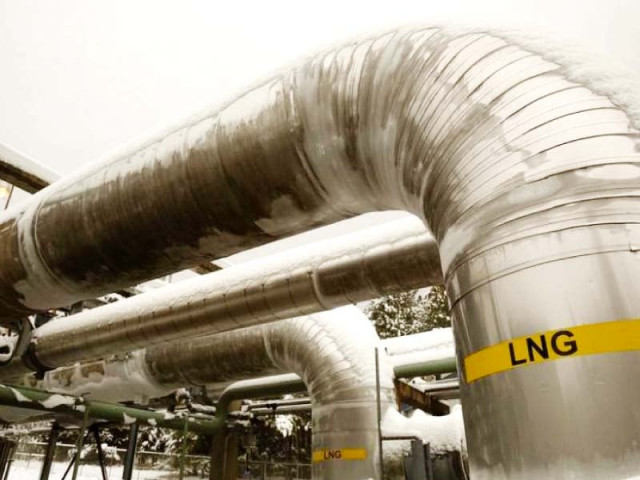SSGC asked to build LNG pipeline from Karachi to Nawabshah
Move aimed at circumventing US sanctions against Russian company originally tasked with project

Earlier, Russian energy giant Gazprom inked a deal with Oil and Gas Development Company Limited, Pakistan’s largest hydrocarbon explorer, to carry out oil and gas explorations through joint ventures. PHOTO: REUTERS
Sources said that Pakistani and Russian companies had finished working on gas pricing modalities but sanctions on RT Global were delaying formal initiation.
“To avoid delay in implementing LNG pipeline project, the government has tasked Sui Southern Gas Company (SSGC) with completing the southern portion of the North-South pipeline project from Karachi to Nawabshah,” they said, adding that RT Global will complete the rest of the project from Nawabshah to Lahore once sanctions are removed.
Qatar joins race to win Pakistan’s LNG pipeline contract
The two governments signed a government-to-government deal in October 2015 to construct the North-South LNG pipeline which will connect LNG terminals in Karachi and Lahore. The move was aimed at addressing Punjab’s energy woes.
The project is to follow a build-operate-transfer (BOT) model with majority of the financing coming from Russia and a Russian-nominated company is supposed to build and operate the pipeline for twenty-five years. After this period, the pipeline will be handed over to Pakistan.
Several conditions are attached to the deal related to minimum LNG imports from Russia and tolling fees. Russia had asked for a tolling fee of $1.2 per million British thermal units (mmbtu) for gas supply which was brought down to 85 cents per mmbtu, after haggling by the Economic Coordination Committee (ECC).
Now, Pakistan has asked Russia for further reductions in price with a commercial agreement expected to be signed soon, followed by a formal groundbreaking of the project.
Pakistan is striving to forge closer ties with Russia in face of weakened relations with the United States coupled with the cozying up of Indian and US governments.
Earlier, Russian energy giant Gazprom inked a deal with Oil and Gas Development Company (OGDC), Pakistan’s largest hydrocarbon explorer, to carry out oil and gas explorations through joint ventures.
In addition to the pipeline contract, Pakistan also plans to import LNG from Russia in a government-to-government arrangement. The latter is a major exporter of gas to Europe, but the US is lobbying to drive Moscow out of this market to reduce Europe’s dependence on Russian energy supplies.
Washington’s backing of the Turkmenistan-Afghanistan-Pakistan-India (Tapi) gas pipeline project also derives from the same ambition.
Pakistan shelves $2b LNG project
Russian investment in the LNG pipeline is expected to open more avenues of capital injection into the energy sector. Electricity production is another area in which Moscow has shown interest and has also offered direct electricity exports to Pakistan.
The pipeline deal with Russia is ideal from Pakistan’s perspective due to low rates of gas transmission and Russian financing of the entire project,” an official stated. Both factors are expected to preserve precious foreign exchange reserves and free up revenues for other developmental projects.
At present, Pakistan is importing LNG from Qatar, and local gas utilities are paid more than 85 cents per mmbtu for gas transmission through their pipeline networks. The fee agreed with Russia earlier was less than the fee being charged by the gas utilities.
Published in The Express Tribune, July 14th, 2017.
Like Business on Facebook, follow @TribuneBiz on Twitter to stay informed and join in the conversation.



















COMMENTS
Comments are moderated and generally will be posted if they are on-topic and not abusive.
For more information, please see our Comments FAQ